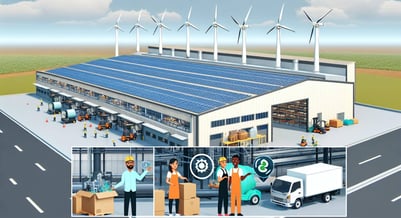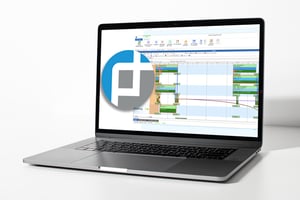Scheduling for Sustainable and Energy-Efficient Manufacturing Processes
In an era where sustainability and energy efficiency are paramount, industrial manufacturing facilities face increasing pressure to minimize their environmental footprint while maintaining productivity. Production planners play a vital role in achieving this delicate balance.
In this blog, we'll explore how production planners can use advanced scheduling techniques, such as those offered by PlanetTogether, integrated with ERP, SCM, and MES systems from industry giants like SAP, Oracle, Microsoft, Kinaxis, and Aveva, to optimize manufacturing processes for sustainability and energy efficiency.

The Sustainability Imperative
Manufacturing industries are significant contributors to environmental challenges, including resource depletion, pollution, and greenhouse gas emissions. As a result, there's a growing recognition that sustainable practices are not only good for the planet but also for business longevity and competitiveness.
Sustainable manufacturing encompasses a range of practices aimed at reducing environmental impact. These practices include:
Energy Efficiency: Minimizing energy consumption through efficient processes and technologies.
Resource Conservation: Reducing material waste and optimizing resource utilization.
Emissions Reduction: Implementing measures to limit air and water pollutants.
Renewable Energy: Transitioning to renewable energy sources to power manufacturing operations.
Circular Economy: Adopting circular economy principles to reduce waste and extend product lifecycles.
Challenges in Sustainable Scheduling
One of the major challenges in achieving sustainable manufacturing is optimizing production schedules while considering sustainability goals. Production planners are tasked with:
Meeting production targets while minimizing energy consumption.
Balancing resource utilization with waste reduction.
Ensuring compliance with environmental regulations.
Adapting to fluctuating customer demand and market conditions.
Traditional scheduling methods often prioritize cost and speed, neglecting sustainability factors. This is where advanced scheduling techniques and integrated systems come into play.


PlanetTogether's Role in Sustainable Scheduling
PlanetTogether is a leading production scheduling software that specializes in optimizing manufacturing operations. It offers a range of features that align with sustainability goals:
Resource Allocation: Efficiently allocate resources, including energy, labor, and materials, to minimize waste and energy consumption.
Constraint Management: Identify and manage constraints to optimize production while minimizing environmental impact.
Real-Time Updates: Gain real-time visibility into production progress, allowing for immediate adjustments to optimize energy use.
What-If Analysis: Simulate different scheduling scenarios to assess the impact of changes on energy efficiency and sustainability goals.

Integration with ERP, SCM, and MES Systems
The full potential of sustainable scheduling is realized when PlanetTogether is integrated with other critical systems. Let's explore how integration with ERP, SCM, and MES systems from industry leaders can drive sustainability in industrial manufacturing.
SAP Integration: Integrating PlanetTogether with SAP ERP allows for real-time data exchange, ensuring that production schedules align with sustainability goals and environmental regulations. This integration streamlines communication and decision-making across departments.
Oracle Integration: Oracle's SCM system combined with PlanetTogether enhances supply chain visibility. By integrating these systems, industrial manufacturers can optimize resource utilization, reduce waste, and minimize energy consumption throughout the supply chain.
Microsoft Dynamics Integration: Microsoft Dynamics offers comprehensive ERP and CRM solutions. Integrating PlanetTogether with Microsoft Dynamics ensures that sustainability considerations are integrated into production planning, helping reduce the carbon footprint and improve energy efficiency.
Kinaxis Integration: Kinaxis RapidResponse is known for its supply chain planning capabilities. When integrated with PlanetTogether, manufacturers can synchronize production schedules with sustainability targets, ensuring that energy-efficient practices are consistently applied.
Aveva Integration: Aveva's MES solutions provide real-time visibility into manufacturing operations. Integrating PlanetTogether with Aveva MES bridges the gap between planning and execution, enabling real-time adjustments to meet sustainability goals.
Benefits of Integration
The integration of PlanetTogether with ERP, SCM, and MES systems, focused on sustainability and energy efficiency, offers several advantages to industrial manufacturing facilities:
Reduced Energy Consumption: Optimize resource allocation and production schedules to minimize energy consumption, lowering operational costs and environmental impact.
Minimized Waste: Efficient scheduling reduces material waste and ensures that resources are used efficiently, contributing to sustainability goals.
Compliance Assurance: Integration with ERP systems ensures that schedules adhere to environmental regulations and sustainability targets, mitigating compliance risks.
Real-Time Monitoring: Gain real-time insights into energy consumption and resource utilization, allowing for immediate adjustments to meet sustainability objectives.
Improved Reputation: Demonstrating a commitment to sustainability can enhance a company's reputation and appeal to environmentally conscious customers.
Scheduling for sustainable and energy-efficient manufacturing processes is no longer an option but a necessity for industrial manufacturing facilities aiming to thrive in a rapidly changing world. By harnessing the capabilities of advanced scheduling software like PlanetTogether and integrating it with ERP, SCM, and MES systems, production planners can play a pivotal role in reducing environmental impact while maintaining productivity.
These integrated systems empower production planners to optimize energy consumption, minimize waste, ensure regulatory compliance, and adapt to changing market conditions. As sustainability becomes a driving force in the manufacturing industry, embracing sustainable scheduling practices is not just a strategy for success—it's a commitment to a greener, more resilient future for both businesses and the planet.
Are you ready to take your manufacturing operations to the next level? Contact us today to learn more about how PlanetTogether and integrated scheduling solutions can help you achieve your sustainability goals and drive success in the industrial industry.























LEAVE A COMMENT